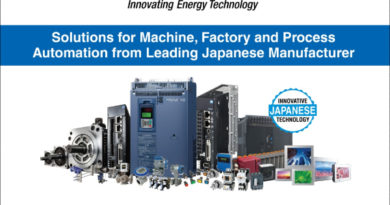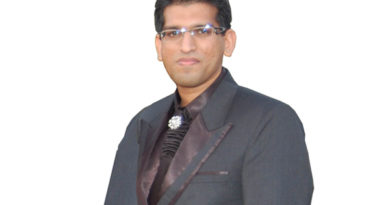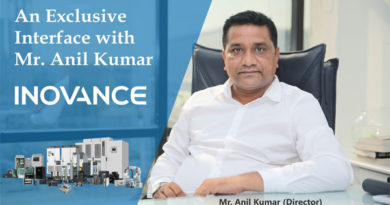Unveiling the Future of Packaging: Interview with Isaac Brana, Head of Weighing Technology Product Management at HBK
Discover the packaging industry advancements through our insightful interview with Isaac Brana, the Head of Weighing Technology Product Management at HBK. Gain valuable insights into the latest trends that are reshaping the packaging landscape as we speak.
In this exclusive conversation, we delve deep into the unique requirements of the food, beverage, cosmetics, and pharmaceutical sectors. Explore the critical importance of meeting stringent safety and hygiene standards and learn how HBK load cells are rising to the occasion. With commitment to innovation, quality, and customer satisfaction, HBK has earned its esteemed reputation as a trusted partner in the packaging industry.
What are the current trends in the packaging industry?
In the packaging industry, we see five major key trends shaping the landscape:
- Continued industry growth: The packaging industry experiences annual growth, and this trend is expected to continue. However, with increasing competition both in developed and developing countries, there is a rise in Mergers and Acquisitions (M&As) with companies actively looking for trustworthy long-term partners.
- Sustainable packaging: New government regulations are driving the shift towards sustainable materials and processes. Buzzwords such as biomaterials, reusable and refillable packaging, reverse logistics, etc., are gaining more prominence.
- Growth of e-commerce: The COVID-19 pandemic has accelerated the growth of e-commerce. To remain competitive, packaging machinery and companies must adapt to meet the specific demands of this market trend.
- Personalization: Consumers are demanding more personalized products, necessitating packaging machines capable of producing smaller production batches, that are more flexible with reduced changeover times.
- Industry 4.0: The packaging industry is being transformed by the introduction of new disruptive technologies such as smart sensors with predictive technologies, Artificial Intelligence (AI), Augmented Reality (AR), decentralized networks, and smart factories. These are all shaping the future of the industry.
What are the specific challenges that weighing sensors must address to meet the requirements of new packaging applications?
The packaging industry presents numerous challenges for weighing sensors. However, prioritizing reliability is crucial to achieve high accuracy, rapid measurements, fast changeovers, and adaptability across various working conditions.
How should weighing sensors be adapted to ensure accuracy and reliability in the unique packaging environments of the food, beverage, cosmetics, and pharmaceutical industries?
To ensure accuracy and reliability in these unique packaging environments, weighing sensors should be carefully selected. Some sensors are specifically designed to work under aseptic conditions and withstand aggressive cleaning agents while others must perform outside for extended periods and provide accurate measurements of high capacities. As a manufacturer of weighing sensors with years of experience, HBK offers a wide range of load cells that meet these demanding needs. Furthermore, we continuously adapt our portfolio to align with evolving market requirements and technological innovations.
What are the specific requirements for weighing sensors to meet the strict safety and hygiene standards of the food, beverage, cosmetics, and pharmaceutical industries?
There are many standards, and every industry is different requiring weighing sensors to fulfill their specific requirements. These include meeting material requirements, facilitating the cleanability of measuring devices, being hermetically sealed, or compliance with international metrology systems such as OIML(International Organization of Legal Metrology), Legal-for-Trade, and explosion-proof standards.
The pharmaceutical industry is one of the most challenging as it has stringent quality standards and regulations set by organizations like the Food and Drug Administration (FDA) in the US, the European Hygienic Engineering & Design Group (EHEDG), and others in Asia. Collaboration with industry experts is therefore essential, and HBK is always ready to support customers in these areas.
How can your globally recognized weighing sensor manufacturing company support the food, beverage, pharmaceutical, and cosmetics industries by offering sustainable solutions and high-quality service?
With over 80 years of expertise, our comprehensive customer support goes beyond supplying weighing sensors and solutions. We offer training programs – providing users with in-depth knowledge of our technologies for easy integration – as well as 24/7 technical assistance for troubleshooting and maintenance. We also offer customized solutions, working in close collaboration with customers to address their specific requirements. Our commitment to long-term partnerships ensures ongoing support, guidance, and expertise to drive efficiency, productivity, and success.
What makes HBK a leading company in weighing technology?
For decades, HBK has based the core business of the weighing technology on three unique strengths:
- Strain gauge manufacturing: HBK designs and produces strain gauges which are fundamental components of our load cells, making us fully independent and reliable for our customers.
- Focus on sensors: Sensors are the first element of the measurement chain. The reliability, precision, and robustness of our weighing solutions are globally recognized, and sensors are the foundation of reliable measurement and detection. Therefore, providing sensors that meet high standards is at the core of our concerns. We are committed to being a leading sensor supplier, ensuring unwavering loyalty to our clients.
- Emphasis on Quality: HBK prioritizes quality. During my professional experience, I have never come across a company that takes quality more seriously than we do. As a result, our load cells exhibit superior behavior and longevity compared to others. This dedication to quality is highly valued by our customers.
How does HBK collaborate with packaging manufacturers to understand their specific needs and offer customized solutions that meet their respective requirements?
At HBK, we prioritize collaboration with packaging manufacturers to understand their specific needs. Through open communication and on-site visits, we gain deep insights into their processes and desired outcomes. Using our technical expertise, we develop solutions tailored to their specific needs, considering factors such as materials, production speeds, and regulatory compliance. We maintain an ongoing feedback loop to refine our solutions and provide continuous support as our customers’ needs evolve.
Can you provide concrete examples where your weighing sensors have successfully addressed specific challenges faced by food, beverage, cosmetics, and pharmaceutical packaging manufacturers?
While there are many examples of how our weighing sensors have addressed specific challenges, one specific case comes to mind. The pharmaceutical industry is one the most challenging industries due to its regulations and high-quality standards, and, for years, strain gauge based weighing sensors (load cells) were seen considered unsuitable due to accuracy limitations and slow dynamic behavior. However, HBK’s product management encouraged engineers to find specific solutions to overcome these constraints. As a result, we are about to launch a new series of load cells designed to address the stringent requirements of the pharmaceutical industry.
Stay tuned for more information!



